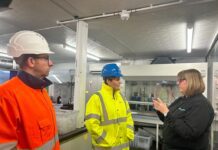
An EU-wide collaborative project, microMole, aims to design and develop a standalone sensor system that will track down the production of illicit substances by being installed in sewage systems. The intention is not only to tackle the social harm linked to this kind of criminal endeavour but also to protect the environment by keeping a closer tab on the spillage of hazardous substances.
The sensor system will allow for the continuous monitoring of wastewater flow, keeping track of the location and place where each sample was taken, in order to provide exhaustive information about the chemical sample for the purpose of using it as legal evidence. The prototype design, development and testing of a system for recording, retrieving and monitoring operations of synthetic drug laboratories in urban areas is the ultimate goal of the project group.
The effort brings together a consortium of 11 members: Warsaw University of Technology (Poland), Central Forensic Laboratory of the Police (Poland), Federal Criminal Police Office (Germany), Blue Technolgies (Poland), CapSenze (Sweden), JGK Tech-Pipeferret (Iceland), Fraunhofer Gesellschaft (Germany), Tilburg University (the Netherlands), Ghent University (Belgium), Université Claude Bernard (France), and Universität der Bundeswehr (Germany).
The proposal has received funding from the European Union’s Horizon 2020 research and innovation programme (under grant agreement No 653626).
Sensor design
The prototype is intended to employ a miniaturised design which can be used in sewage pipes, with a robust housing appropriate to this kind of environment. Other features listed in the specification include minimal power consumption, enhanced operation time supported by thermoelectric energy harvesting, high-specificity electro-chemical sensors, ultra-low power analogue-to-digital converter, integrated micro-tanks for sample storage, and secure GSM and radio communications for remote monitoring. Analysis of privacy law, data protection and social acceptance aspects of the project will be carried out at different stages, according to a press release about the project issued by the Fraunhofer Institute.
Focus areas of technological innovation highlighted by the developers include the integrated circuit design underlying the optimized voltage converter for thermoelectric energy harvesting, as well as ultra-low power analogue-to-digital converters for capacitive sensors with low input voltage and current. Moreover, a thermal path design between the thermoelectric generators and the sewage water system will be developed in order to increase the harvested energy. The development of a microfluidic system containing microchannels, a microvalve, microfilters, detection chamber and tanks for the analysis of sewage waste is also a key technological issue in the microMole project.
The project will run for three years.







